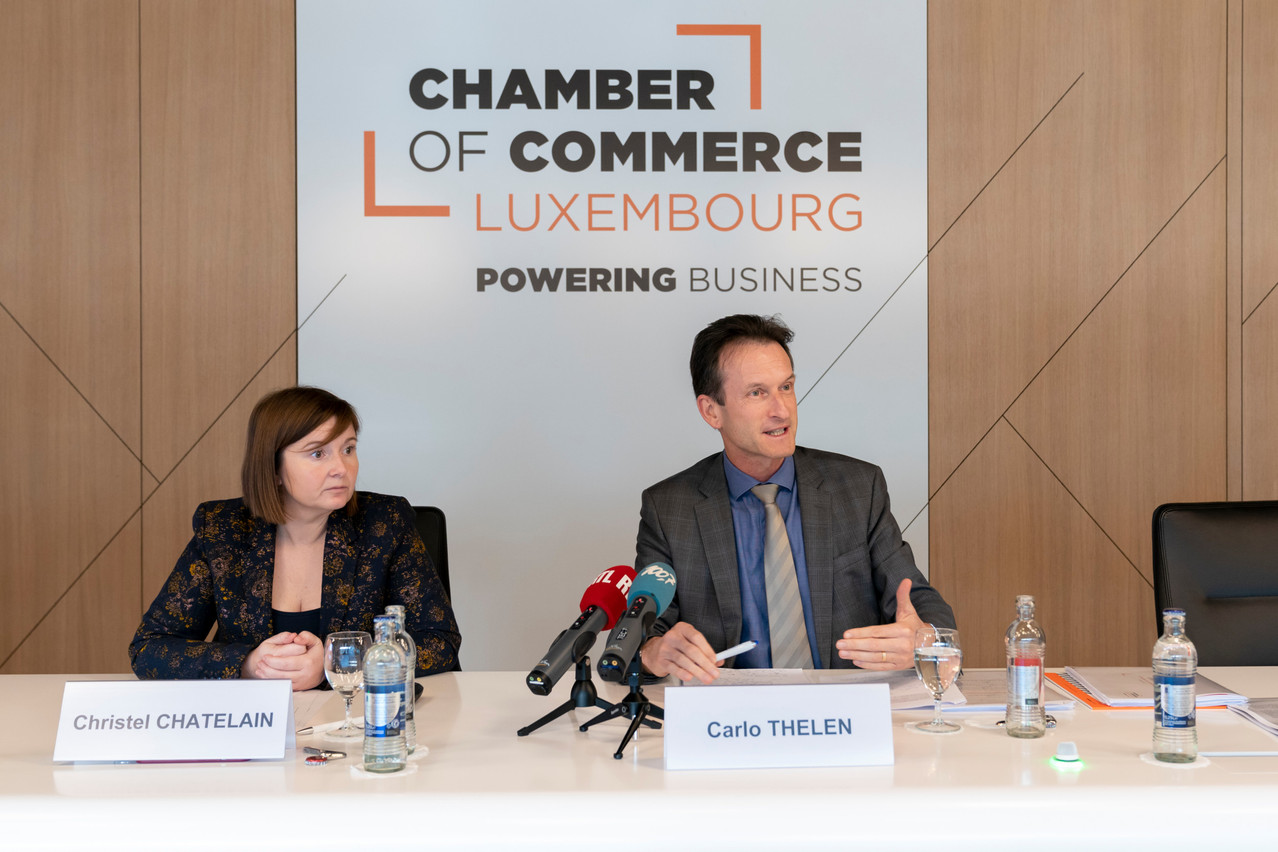Christel Chatelain, director of economic affairs, and , director general, presented on 23 November the Chamber of Commerce’s opinion on the . As the Chamber of Crafts pointed out on the 2023 budget, the Chamber of Commerce is concerned about the plunge in the various deficits of the state’s public finances. , it believes that the trajectory of the budget after 2024 has been estimated according to a more optimistic than realistic scenario.
However, it recognised that the “economic situation which bends but does not break (yet),” in its geo-ecopolitical instability, does not favour immediate resilience. It also noted that Luxembourg is facing what it describes as “cascading shocks,” with a fall in attractiveness, profitability and business confidence.
Fear of budgetary slippage
The Chamber of Commerce noted that the central government balance would show a new deficit of €2.8bn in 2023, only three years after the 2020 deficit, which was “the second largest deficit in its history.” It also noted that according to these forecasts, “no less than €10bn of deficits would accumulate over the period 2021-2026, leaving little budgetary room for manoeuvre in the event of an additional shock.”
With budgetary revisions to GDP growth regularly revised downwards over the last two years (from 6% to 5.1% in 2021 and from 3.5% to 2.5% in 2022), it believes that “significant revisions cannot be ruled out” for 2023 and 2024. Once again, it fears a “budgetary slippage” in the event of a new economic shock in 2023.
The accumulation of deficits mechanically leads to a drift in public debt and the draft budget forecasts a debt ratio of 29.5% of GDP in 2026, at the limit of the 30% that the government has set itself. According to the chamber, this constitutes “a situation that threatens the AAA rating, which is essential for the Luxembourgish economy.” Finally, the social security deficit was again mentioned, Thelen having previously described it as “a real social time bomb.”
Read also
Indexation: a disaster for businesses
The inclusion in the draft budget of two radically different inflation scenarios illustrates, for the Chamber of Commerce, the “thick fog” and the need to provide additional budgetary leeway. Thus, a first scenario, postulating a transitory energy shock, envisages an inflation of 2.5% and an indexation bracket in 2024. The other scenario, taking into account a permanent energy shock, assumes a price increase of 8.4% and three indexation tranches--which would be “a disaster for companies.”
Economic diversification requires an attractive general environment. The indexation of salaries in its current form “certainly does not contribute to such an environment and the compensation of a possible third indexation tranche in 2023, in accordance with the tripartite agreement of 28 September 2022, has been announced but not budgeted for,” explained the chamber. It also pointed out that companies, already burdened by heavy energy costs and reduced growth, may not be able to withstand a shock to the labour market, such as a “big resignation” phenomenon. In this context, government revenues, currently at 15.7% from taxes on wages and salaries, remain “volatile and uncertain,” it said.
Talent and attractiveness: priority challenges
According to the Chamber of Commerce, government spending on talent and attractiveness has been somewhat sidelined in favour of “defensive and transitional provisions.” It nevertheless recognised that the latter are necessary, as they are intended to help households and businesses in the face of energy inflation. However, the chamber considers that attracting new skilled and unskilled talent to Luxembourg is “the sine qua non condition for other challenges,” notably energy, digital transition, the environmental challenge and the country’s attractiveness.
However, it welcomed the two one-off tax measures announced by the government. On the one hand, the minimum annual remuneration threshold for access to the impatriate regime and, on the other, the scope for calculating the participation bonus. But it considers them “rather timid” and asks for “additional measures, in particular to facilitate non-European immigration of highly qualified people, in a context where the recourse to European workers in general, and from the greater region in particular, no longer seems sufficient.” This effort to improve attractiveness must go hand in hand with a substantial effort in terms of training and with a diagnosis of skills to know what the country will need in the years to come.
Bringing in talent also creates a dependency on the issue of housing, another essential subject in the state budget, but the chamber commented that “the means mobilised are slow to produce concrete results.”
Tax competition does not stop because of crises
The Chamber of Commerce believes that maintaining Luxembourg’s attractiveness will also depend on taxation. While a comprehensive tax reform is not the government’s priority, the chamber said that no roadmap has been outlined to give companies predictability, arguing that “tax competition does not stop because of crises.”
However, it notes the tax provisions adopted in the draft budget and welcomes, in particular, the raising of the income threshold for impatriate workers and the extension of the scope of the participation premium. However, it believes that these measures would benefit from being “completed" and “more incisive.” Other tax measures are “less commendable,” according to the chamber, such as the modification of accelerated depreciation, a measure “which can only increase the upward pressure on rents and penalise the supply of housing.”
Beyond these specific measures and in the face of ever-present international tax competition, the Chamber of Commerce reiterated its request to the government to establish a “tax package.” To this end, it referred to the list of it has drawn up, available on its website and intended to modernise the current tax system.
This story was first published in French on . It has been translated and edited for Delano.
